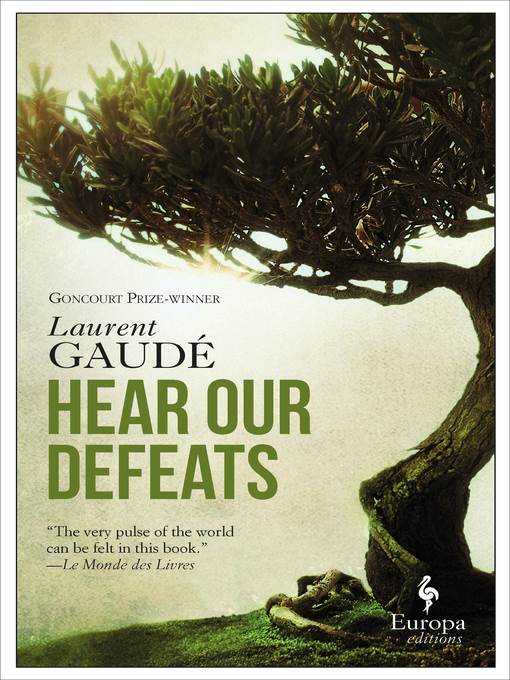
Hear Our Defeats
- اطلاعات
- نقد و بررسی
- دیدگاه کاربران
نقد و بررسی

Starred review from December 1, 2018
In packed yet propulsive language, Prix Goncourt winner Gaudé (The House of Scorta) considers what war does to humanity. Going by the name Assem Graieb, a French intelligence officer hunts down Sullivan Sicoh, a disaffected former member of the U.S. Special Forces who saw it all during fighting in Afghanistan and has become a drug trafficker. But first Assem has one memorable night of passion with Mariam, an Iraqi archaeologist shattered by the loss of her country's antiquities. She even gives Assem a statuette that threads its way through the narrative as a symbol of endurance, but she won't connect with him further. Meanwhile, Gaudé effectively weaves in accounts of Agamemnon's sacrifice of Iphigenia, Hannibal's march against Rome, the U.S. Civil War, and Emperor Haile Selassie's rout by Italian troops to reveal war's devastation. Yet he also reminds us that we are only human in our defeats, and what we have lost somehow endures. VERDICT Highly recommended for smart readers.
Copyright 2018 Library Journal, LLC Used with permission.

December 1, 2018
In packed yet propulsive language, Prix Goncourt winner Gaudé (The House of Scorta) considers what war does to humanity. Going by the name Assem Graieb, a French intelligence officer hunts down Sullivan Sicoh, a disaffected former member of the U.S. Special Forces who saw it all during fighting in Afghanistan and has become a drug trafficker. But first Assem has one memorable night of passion with Mariam, an Iraqi archaeologist shattered by the loss of her country's antiquities. She even gives Assem a statuette that threads its way through the narrative as a symbol of endurance, but she won't connect with him further. Meanwhile, Gaudé effectively weaves in accounts of Agamemnon's sacrifice of Iphigenia, Hannibal's march against Rome, the U.S. Civil War, and Emperor Haile Selassie's rout by Italian troops to reveal war's devastation. Yet he also reminds us that we are only human in our defeats, and what we have lost somehow endures. VERDICT Highly recommended for smart readers.
Copyright 2018 Library Journal, LLC Used with permission.

February 1, 2019
In this allusive and allegorical tale, a French intelligence officer chases an unlikely quarry across continents.Assem Graieb--his pseudonym redolent of Abu Ghraib, the infamous prison--is "a killer for the Republic, constantly on the hunt for new targets." His travels have taken him from France to Africa, the Middle East, Asia, and now he's after an American, "a solid guy" who has gotten caught up in the drug trade out of Afghanistan, his mission to assess and then eliminate. Along the way, he falls in with Mariam, an archaeologist who hides an ancient statue in his luggage, the safest hiding place she can think of. The statue, of an ancient deity, is just a step ahead of being erased from history by the idolatry-despising foot soldiers of the Islamic State group, and Sullivan Sicoh, the object of Assem's hunt, wouldn't hesitate to put it on the market alongside his other wares. They have their rationale, and so does Mariam, and so does Assem. The story would be a terse procedural if confined to this century, but Prix Goncourt winner Gaudé complicates it with interspersed tales of other warriors across the centuries, from Hannibal to Ulysses S. Grant and Haile Selassie ("He is just a rat fleeing from the eyes of the Italian eagle that wants to devour him"), none of them strangers to desperate fights. Gaudé's purpose in blending these characters from many times and places is not immediately evident, but he writes with a philosophical eye to history and the constant, unerring habit of time to want to obliterate all the accomplishments of our kind: "And he knows in that instant," Gaudé writes, poetically, "that everything has truly been erased, that he has managed to escape from who he was."As a story, Gaudé's latest is a modest accomplishment itself, but it is rich in philosophical possibilities that make it memorable.
COPYRIGHT(2019) Kirkus Reviews, ALL RIGHTS RESERVED.




دیدگاه کاربران